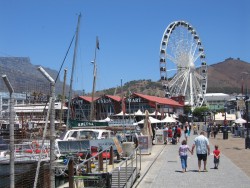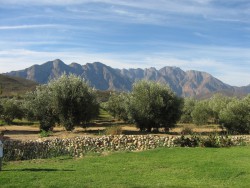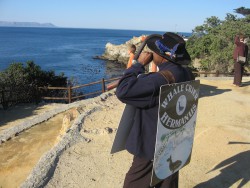- Home » Expat Articles » Interviews » German Expat Living in South Africa - Interview with Regina
German Expat Living in South Africa - Interview with Regina
| Published: | 21 May at 9 AM |
Want to get involved?
Become a Featured Expat and take our interview.
Become a Local Expert and contribute articles.
Get in touch today!
Become a Local Expert and contribute articles.
Get in touch today!
Filed: Interviews,South Africa
Regina is a German expatriate and co-author of Living in South Africa, an expat guide book on moving to, working in and enjoying life in South Africa. She has lived and worked in the USA, Australia, Singapore and various European countries before settling with her family in Cape Town in 2005. A passionate teacher and blogger, she loves to share her insights with people from all over the world. Her practical website and handbook about South Africa was born out of the desire to provide real information and up-to-date resources that are not always readily available. Regina's expat blog is called Expat Cape Town (see listing here)
Where are you originally from?
Munich, Germany
In which country and city are you living now?
Cape Town, South Africa
How long have you lived in South Africa and how long are you planning to stay?
We planned to stay for a couple of years only, but now we are here already for almost ten years, making this stay the longest one in our expat careers! We really enjoy living in South Africa and plan to stay on for longer as there is still so much more to explore and experience in Africa and Cape Town is a beautiful city.
Why did you move to South Africa and what do you do?
We were living already for five years in England where my husband had worked as an engineer and I worked as a part-time teacher at the university. As we both looked for a new challenge and were sick of the grey skies, we took the chance to move on when my husband was offered an inter-company transfer to South Africa. We wanted to give our boys the opportunity to 'see the world', broaden our horizons and enjoy a more outdoors-oriented lifestyle.
Did you bring family with you?
Yes, we have two boys, then aged 3 and 5.
How did you find the transition to living in a foreign country?
Moving to a foreign country always is a challenge. We had lived and worked in several other countries and encountered various cultures before, so we thought moving again would be a breeze. Oh my, were we wrong! Culture Shock hit hard and there was hardly any information to prepare us for the move to South Africa.
Was it easy making friends and meeting people; do you mainly socialise with other expats?
South Africans are very welcoming and their attitude and openness is so refreshing. There are lots of expats in Cape Town and several foreign communities have their own clubs, but generally people socialise irrespective of nationality or background.
What are the best things to do in the area; anything to recommend to future expats?
Travel the country, meet people and experience the different cultures. Experience the many local attractions, events and festivals, explore the winelands and taste the local food, go hiking in the mountains and admire awesome rock formations and ancient rock paintings. Swim with penguins at Boulders Beach lagoon in summer or simply stroll along endless beaches and enjoy whale watching in season from May to November.
What do you enjoy most about living in South Africa?
Always seeing smiling faces. Living in one of the most beautiful cities in the world. Seeing Table Mountain every day. Being near the sea and listening to the sound of the waves. Sunny skies most of the year and thus plenty of outdoors activities to enjoy.
How does the cost of living in South Africa compare to home?
The cost of living is generally less, however this depends largely on your willingness to buy local instead of buying products from overseas. Foreign or imported products are usually very expensive, these costs are usually double or more. You also have to be aware that the standard of living is different too and you will have to dig deep in your pockets for goods the people here value as 'luxury goods'. Housing costs are generally lower, also depending again on luxury touches such as swimming pools, modern appliances, insulation, air-con etc. Costs for transport are much higher, used cars are especially expensive. School fees need to be considered, however private school fees are much lower than you would pay for private schools overseas. And remember you will need to take out private health insurance, as you definitely want to be able to go to a private clinic/hospital should you need medical attention.
What negatives, if any, are there to living in South Africa?
Lifepartners and spouses accompanying work permit holders are not allowed to work, if they have not been granted their own work permit by the Department of Home Affairs. Also volunteer work or taking up studies require special permits and the application process for any permit involves a lot of paperwork, time, patience and perseverance.
If you could pick one piece of advice to anyone moving to South Africa, what would it be?
Get informed and read up as much as you can about life in South Africa.
What has been the hardest aspect to your expat experience so far?
Being far from loved ones back in Germany and being confronted with inequality and poverty in Africa.
When you finally return home, how do you think you'll cope with repatriation?
It surely will be very strange, as we have not lived in Germany for over 20 years! Although we try to go for an annual holiday to see family and friends overseas.
What are your top 5 expat tips for anyone following in your footsteps?
Expat Cape Town is a site for all looking for up-to-date and detailed info on moving to and living in Cape Town/South Africa. You will find everything from how to deal with culture shock to fun activities on my site. Lots of info on the best housing areas, schooling tips, family activities, expat clubs and communities as well as an event calendar showing you the best events happening every month. Detailed information about my handbook can be found on: www. living-in-south-africa.com.
How can you be contacted for further advice to future expats coming to your area?
Contact via the blog, the websites or join our friendly facebook-forum 'Expat Cape Town'.
Here's the interview with Regina...
Where are you originally from?
Munich, Germany
In which country and city are you living now?
Cape Town, South Africa
How long have you lived in South Africa and how long are you planning to stay?
We planned to stay for a couple of years only, but now we are here already for almost ten years, making this stay the longest one in our expat careers! We really enjoy living in South Africa and plan to stay on for longer as there is still so much more to explore and experience in Africa and Cape Town is a beautiful city.
Why did you move to South Africa and what do you do?
We were living already for five years in England where my husband had worked as an engineer and I worked as a part-time teacher at the university. As we both looked for a new challenge and were sick of the grey skies, we took the chance to move on when my husband was offered an inter-company transfer to South Africa. We wanted to give our boys the opportunity to 'see the world', broaden our horizons and enjoy a more outdoors-oriented lifestyle.
Did you bring family with you?
Yes, we have two boys, then aged 3 and 5.
How did you find the transition to living in a foreign country?
Moving to a foreign country always is a challenge. We had lived and worked in several other countries and encountered various cultures before, so we thought moving again would be a breeze. Oh my, were we wrong! Culture Shock hit hard and there was hardly any information to prepare us for the move to South Africa.
Was it easy making friends and meeting people; do you mainly socialise with other expats?
South Africans are very welcoming and their attitude and openness is so refreshing. There are lots of expats in Cape Town and several foreign communities have their own clubs, but generally people socialise irrespective of nationality or background.
What are the best things to do in the area; anything to recommend to future expats?
Travel the country, meet people and experience the different cultures. Experience the many local attractions, events and festivals, explore the winelands and taste the local food, go hiking in the mountains and admire awesome rock formations and ancient rock paintings. Swim with penguins at Boulders Beach lagoon in summer or simply stroll along endless beaches and enjoy whale watching in season from May to November.
What do you enjoy most about living in South Africa?
Always seeing smiling faces. Living in one of the most beautiful cities in the world. Seeing Table Mountain every day. Being near the sea and listening to the sound of the waves. Sunny skies most of the year and thus plenty of outdoors activities to enjoy.
How does the cost of living in South Africa compare to home?
The cost of living is generally less, however this depends largely on your willingness to buy local instead of buying products from overseas. Foreign or imported products are usually very expensive, these costs are usually double or more. You also have to be aware that the standard of living is different too and you will have to dig deep in your pockets for goods the people here value as 'luxury goods'. Housing costs are generally lower, also depending again on luxury touches such as swimming pools, modern appliances, insulation, air-con etc. Costs for transport are much higher, used cars are especially expensive. School fees need to be considered, however private school fees are much lower than you would pay for private schools overseas. And remember you will need to take out private health insurance, as you definitely want to be able to go to a private clinic/hospital should you need medical attention.
What negatives, if any, are there to living in South Africa?
Lifepartners and spouses accompanying work permit holders are not allowed to work, if they have not been granted their own work permit by the Department of Home Affairs. Also volunteer work or taking up studies require special permits and the application process for any permit involves a lot of paperwork, time, patience and perseverance.
If you could pick one piece of advice to anyone moving to South Africa, what would it be?
Get informed and read up as much as you can about life in South Africa.
What has been the hardest aspect to your expat experience so far?
Being far from loved ones back in Germany and being confronted with inequality and poverty in Africa.
When you finally return home, how do you think you'll cope with repatriation?
It surely will be very strange, as we have not lived in Germany for over 20 years! Although we try to go for an annual holiday to see family and friends overseas.
What are your top 5 expat tips for anyone following in your footsteps?
- Research before you go
- Get out and meet people
- Taste local food and visit local events
- Learn a local language and some slang
- Stay positive and smile a lot
Expat Cape Town is a site for all looking for up-to-date and detailed info on moving to and living in Cape Town/South Africa. You will find everything from how to deal with culture shock to fun activities on my site. Lots of info on the best housing areas, schooling tips, family activities, expat clubs and communities as well as an event calendar showing you the best events happening every month. Detailed information about my handbook can be found on: www. living-in-south-africa.com.
How can you be contacted for further advice to future expats coming to your area?
Contact via the blog, the websites or join our friendly facebook-forum 'Expat Cape Town'.
Grab a featured expat badge that links to this interview!
 Copy and paste code to display the Featured Expat Badge:
Copy and paste code to display the Featured Expat Badge:Comments » No published comments just yet for this article...
Feel free to have your say on this item. Go on... be the first!





 Regina is a German expat living in South Africa. Blog description: Follow our expatriate family's experiences in vibrant and multicultural Cape Town. Living in South Africa's friendly Mother City attracts people from all nations. Find a multitude of insights from Culture Shock to Business Guide. Enjoy:-)
Regina is a German expat living in South Africa. Blog description: Follow our expatriate family's experiences in vibrant and multicultural Cape Town. Living in South Africa's friendly Mother City attracts people from all nations. Find a multitude of insights from Culture Shock to Business Guide. Enjoy:-)





